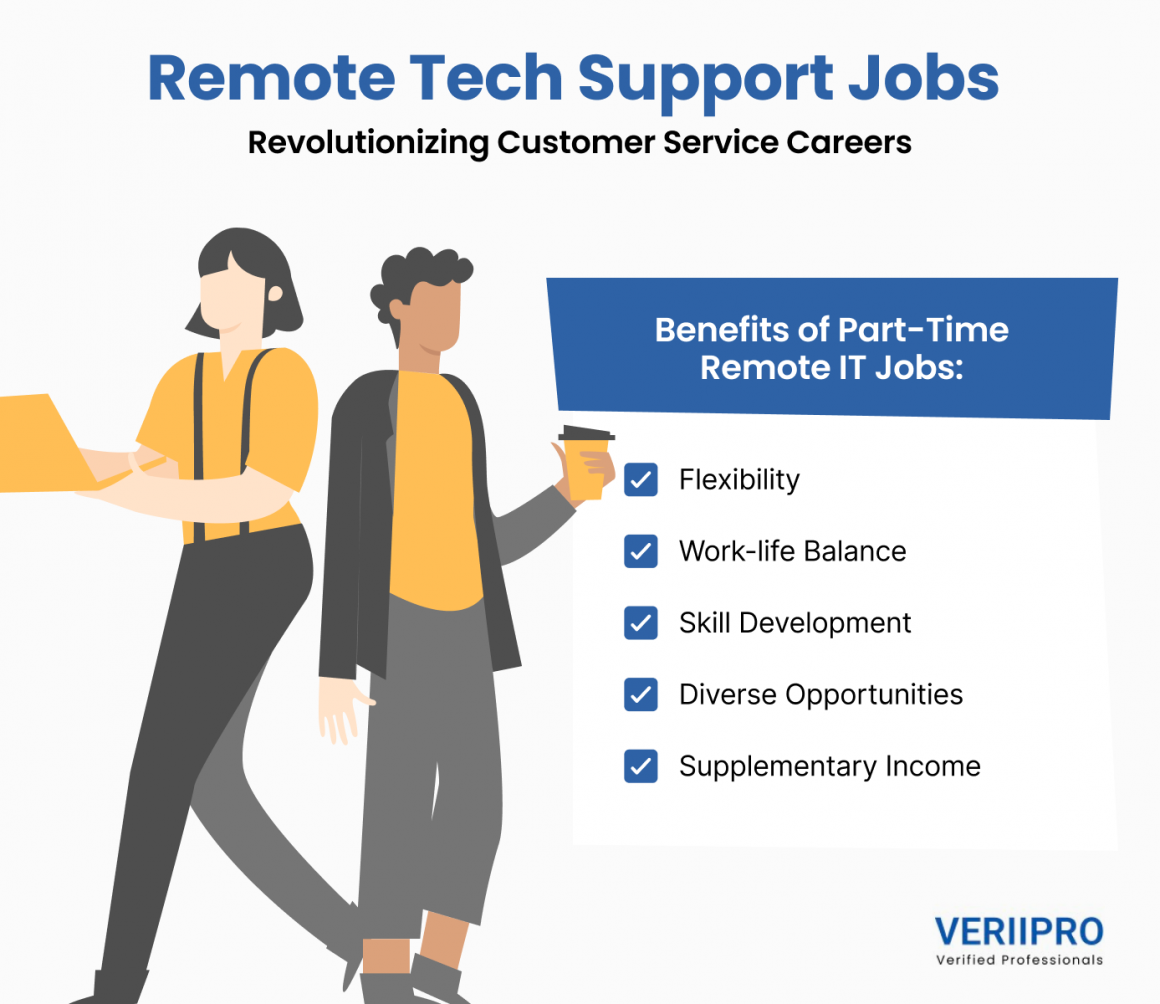Are Remote Tech Support Jobs the New Norm in Customer Service?
Remote tech support roles focus on providing on-call or online technical assistance to customers from around the world. Most tech support providers are connected to their working networks through the Internet and do not need to work from a traditional office setting. Remote positions are revolutionizing the world of customer service by offering job flexibility for workers, and convenience for customers.
Remote job roles can range from part-time to full-time positions, giving workers the option to choose their own working hours and boundaries. They usually include customer care tasks such as troubleshooting technical problems, providing online assistance, and guiding users through company platforms to create a positive service experience.
If you are a skilled professional who is looking for remote IT jobs, there is a lot you need to know before selecting a role that suits your profile. This article provides insights into the expanding world of remote customer care jobs, and how workers can use this shift in work expectations to forge successful careers.
The Rise of Remote IT Job Positions in Customer Care
As digitization takes over the world of business, we are noticing a sharp rise in the popularity of an online workforce. Remote workers are people who sell their skills in different domains of the IT industry by online mode. Remote working positions allow their employees to work from anywhere in the world, as long as they stay connected to their workplace through the internet.
Common remote IT jobs in customer service include roles such as technical support engineers, help desk assistants, system administrators, and marketing specialists. These professionals provide remote assistance to customers by solving technical problems related to software or system networks. They may provide on-call troubleshooting advice, or even work directly on a network to resolve common issues. Remote workers in sales might help customers in their online shopping journeys and guide them past any inquiries or concerns about a product.
Successful remote IT workers require strong technical expertise, domain-specific knowledge, problem-solving abilities, and excellent communication skills. The following factors drive the rise of remote IT jobs in customer care:
Globalization
The growth of multinational businesses means that companies now need to provide customer support across different time zones. Remote IT customer care enables companies to offer round-the-clock customer care without establishing physical offices in every part of the world.
Technological Advancement
The proliferation of high-speed internet, cloud-based software, and digital finance has made remote work more feasible and efficient than ever. IT professionals can now stay at home as they troubleshoot issues, access company systems, and collaborate with colleagues -all through online work.
Cost Savings
Remote IT work eliminates the need for companies to invest in office space, utilities, and other costs associated with running a traditional workplace infrastructure. This helps organizations save costs that were previously spent on maintaining permanent physical offices in different regions of the globe.
Access to Better Human Resources
By offering remote jobs, companies can tap into a global talent pool of skilled workers rather than being limited by the constraints of local hiring. As newer businesses are looking for skilled professionals with expertise in specific domains, hiring globally allows employers to find better matches for their organization’s requirements.
Benefits of Part-Time Remote IT Jobs: Balancing Flexibility and Service

Many IT professionals prefer the flexibility and autonomy offered by remote job positions. Customer care remote jobs allow workers to achieve a better work-life balance, avoid long commutes, and choose working environments that suit their temperaments. Here are five key benefits of part-time remote IT jobs:
Flexibility
Part-time IT positions allow workers to choose their working hours, and work from anywhere in the world. This flexibility lets workers pursue personal commitments or interests while still being available to work online.
Work-life Balance
Remote customer care jobs usually require workers to offer their services for a limited number of hours within a day. Compared to traditional jobs, this saves workers time as they don’t need to travel to offices. As a result, part-time workers can afford a healthy work-life balance with reduced stress and burnout.
Skill Development
Part-time remote IT jobs give workers the time to focus on developing their interests and learning new skills while still staying employed. Remote employees can gain work experience and industry exposure while staying away from the traditional office culture. This gives them the independence to create a unique skill base which can be valuable for future career advancement or transitioning to a new field.
Supplementary Income
Part-time IT jobs can help skilled workers get lucrative pay from selling their services to a global client base. This allows them to earn better financial stability and make investments towards personal goals while still staying engaged in their daily family responsibilities.
Diverse Opportunities
Part-time remote jobs can offer an enriching professional experience to workers without requiring them to relocate for work. This means that skilled professionals can access exciting opportunities in various industries, sectors, and projects spread across the globe. Remote work is also a great way to build relationships with diverse clients and establish a powerful professional network.
The Role of a Chief Engineer in Remote Tech Support
Chief engineers play a pivotal role in ensuring the smooth operation of technical support teams. They are responsible for overseeing the key aspects of technical support provided to customers and maintaining the quality of technical services over time. Remote chief engineer positions are usually reserved for experienced professionals who can manage a team of customer support providers, troubleshoot technical issues, and guide monitoring and maintenance processes.
The chief engineer is involved in setting technical standards and establishing best practices to improve the quality of remote tech support operations. They are primarily responsible for building a management framework for technical support workers and leading them toward the successful implementation of assigned tasks. They often collaborate with other departments to identify and address technical challenges, resulting in optimized system performance and productivity.
Chief engineers are also involved in conducting R&D and planning detailed road maps for implementing new technologies to enhance service delivery and customer satisfaction. They may take on mentoring roles where they train new technical support staff, conduct performance evaluations, and provide guidance to ensure the team’s success.
Customer Care from Home: The Shift to Remote Jobs
The rise of customer care work-from-home jobs reflects a broader trend towards flexible working arrangements fueled by increasing dependence on technology. The widespread adoption of the Internet and cloud-based platforms has enabled modern companies to employ skilled professionals from anywhere in the world.
As remote roles do not need employees to move closer to a physical office, they can easily market their skills without having to change their living situations. When it comes to employers, employing remote workers allows organizations to access a worldwide talent pool at competitive costs without needing to establish regional workspaces. This means that remote IT jobs create a win-win scenario where both employers and employees take home their own set of perks.
If the current scenario of rising customer care from home roles is any indication, the shift to remote jobs is here to stay. As flexible working conditions become a norm, organizations are boldly recruiting fresh talent through online mode. This development offers a growing pool of opportunities to talented professionals who are looking for online jobs in the IT industry.
Professionals such as analysts, software engineers, marketers, graphic designers, and technical assistance providers can now access high-paying remote working positions from the comfort of their homes. Remote tech support jobs can be easily found on popular IT recruitment websites like VeriiPro and LinkedIn. Using verified professional networks to find new talent is one of the most favored recruitment methods for IT companies. Consequently, building a strong online presence on networks such as VeriiPro can help remote workers gain access to a trustable pool of exclusive job listings.
If you are a skilled professional who is looking for remote job roles in the customer care industry, join VeriiPro today to fast-forward your career trajectory.
Frequently Asked Questions –
What are remote tech support jobs?
Remote tech support jobs involve providing technical assistance and customer service to clients or customers from a remote location, typically from home. These roles can range from part-time to full-time positions and may include tasks such as troubleshooting technical issues, guiding users through solutions, and ensuring a positive customer service experience.
How are remote tech support jobs shaping the future of customer service?
Remote tech support jobs are revolutionizing customer service by offering flexibility and convenience for both employees and customers. They allow for a broader talent pool by not limiting positions to specific geographic locations and can lead to increased job satisfaction due to the flexibility they offer. This shift is contributing to a new norm in customer service, where remote work is becoming increasingly prevalent.
What types of remote tech support jobs are available?
There are several types of remote tech support jobs available, including part-time and full-time roles. Positions can range from entry-level customer service representatives to more specialized roles such as technical support engineers or chief engineers in remote tech support.
What skills and qualifications do I need for a remote tech support job?
The required skills and qualifications for a remote tech support job can vary depending on the position. Candidates should have strong technical knowledge relevant to the products or services they will be supporting, excellent communication skills, problem-solving abilities, and a customer-oriented mindset. Some positions may also require specific certifications or technical degrees.
How can I find remote tech support jobs?
Remote tech support jobs can be found on IT recruitment websites like VeriiPro, which may offer exclusive job listings not available elsewhere. These platforms can streamline the job search process by providing filters and categories specific to remote IT jobs, making it easier for job seekers to find positions that match their skills and preferences.
Are all remote tech support jobs full-time?
No, remote tech support jobs can be either part-time or full-time, offering flexibility for individuals with different availability and work preferences. Some roles may also offer flexible schedules or project-based work.
What is the demand for remote tech support jobs?
The demand for remote tech support jobs is growing as more companies recognize the benefits of remote work and seek to provide round-the-clock support to their customers globally. This trend is likely to continue as advancements in technology make remote work more feasible and as customer expectations for immediate, effective support increase.
How does VeriiPro help me land a remote tech support job?
VeriiPro helps job seekers land remote tech support jobs by offering a platform that connects them with exclusive job listings, provides insights into the current demand for IT jobs, and offers resources on what IT companies are looking for in potential hires. The platform may also offer tools and services to streamline the job search and application process








